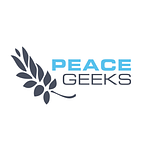Hacking to improve immigrant and refugee settlement
For anyone familiar with the term ‘hackathon,’ an image of caffeine-fueled programmers huddled intensely around computer screens often comes to mind. But beyond being coding marathons, hackathons offer immense potential to connect diverse perspectives and propel targeted, impact-driven solutions. Bringing together newcomer service providers, immigrants, refugees, social innovators, community stakeholders and technologists, our November mini-hackathon called #peacehack put people, rather than the technology, at the center of the process. Facilitated by community tech partner Axiom Zen, #peacehack was an “ideas hack” that used Design Thinking methodology. The process challenged teams of participants to fully understand existing challenges for stakeholders and end users, before designing viable solutions.
The panel discussion on Saturday was particularly revealing towards the shortcomings of newcomer settlement in Greater Vancouver. One of the panelists was Mohammed Alsaleh, a Syrian refugee who was celebrating his second anniversary in Canada that Friday night, and whose journey to Canada has recently been featured in a poignant mini documentary by The Atlantic. Now a resettlement counsellor helping Syrians upon arrival for Immigrant Services Society of BC (ISSofBC), Mohammed recounted how existing processes can often feel divorced from the programming that is created to serve immigrants.
A similar sentiment was resonated by fellow panelist Angelique Muhorakeye, a Rwandan refugee and criminology student at Douglas College. Angelique arrived in Canada three years ago with her mother, sister, niece and son. She spoke of being unprepared for aspects of daily Canadian life, from details as small as knowing about sales tax, to aspects as large as knowing what resources are relevant for her family.
Likewise, panelist Michel Pouliot, Executive Director of Burnaby Family Life, cited that 50% of newcomers are uncomfortable navigating the current system to access the services they need, a finding from the Burnaby Intercultural Planning Table. As well, the lack of resources, particularly for childminding and staff recruitment, continues to burden existing newcomer serving organizations.
Panelist Nadia Carvalho, Chair of the Vancouver Immigration Partnership, elaborated on the Local Immigration Partnerships (LIPs), which are community-based partnerships aimed at improving newcomer integration through knowledge-sharing, strategic planning and service coordination between organizations. One challenge, as she explained, is that programs are typically government funded for five years, but the process to become a Permanent Resident often takes longer. Nadia also emphasized expanding industry mentorship, noting that mentorship has been shown to increase employment income for newcomers by 60%.
The final panelist, Adel Iskandar, Assistant Professor of Global Communication at SFU, brought attention towards community cohesion and bridging the connection between Canadians, immigrants and First Nations. Acknowledging anti-immigrant sentiments, Adel pointed out conversely that throughout history, immigrants have always been shown to enhance the communities in which they take part.
After the panel, groups broke out to generate problem statements and identify possible solutions for four key challenges identified in the LIPs: improving access to information on services, strengthening local language skills, building community connections and strengthening networking and mentorship opportunities. A fifth group was formed around an issue identified during the event: fostering local understanding towards newcomers. With participants representing diverse age groups, sectors and nationalities from Afghanistan to Brazil to Iraq, the breakout sessions were buzzing with ideas. A recurring theme through each of the groups was that relationships — in one way or another — were the answer to each of the issues. Creating community through dialogue and understanding helps foster empathy and in turn, solutions.
At lunch, we paused for a delicious meal prepared by Tayybeh, a collective of Syrian refugee women who started a local catering business from their home-cooked food. Afterwards, the breakout groups prepared to present their solutions and designs for prototypes. An impressive range of ideas emerged, which will be workshopped in the new year with local service providers who work in these areas.
These ideas included:
- Language Mentorship Program: an app that matches newcomers who are seeking to improve their local language skills with local language mentors (retired or student teachers and other interested volunteers);
- Keymunity: a self-directed case management engine that consolidates information about newcomer service availability, and helps to determine a newcomer’s need and service plan based on a user profile;
- Keysultant: an embedded “live chat” tool on service websites, which can provide direct answers to newcomers’ questions through responses crowd-sourced from a community of service providers;
- Linkedegration: an extension integrated with LinkedIn that would allow users to tailor their employment profile to their country or city’s job market based on their location. Features of this extension would include a resume builder, online mentors and invitations to relevant networking events and courses;
- Building Community Connections: an event series that facilitates community building, following a tiered engagement model that allows participants to move through the series based on their comfort level. Events include orientations to the city and interest-based meet ups.
A second hackathon will take place this spring, where we will take the best and most developed ideas to teams of technologists in order to produce working prototypes.
Interested in participating or staying in the loop about how we are designing a more welcoming future for newcomers? Subscribe to our newsletter or follow us on Facebook and Twitter!
Written by Daniel Morton, Nikki Koutsochilis and Cherrie Lam
Originally published at peacegeeks.org.
